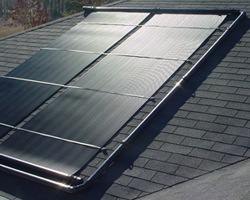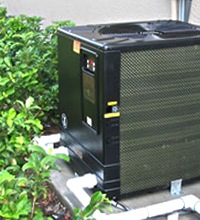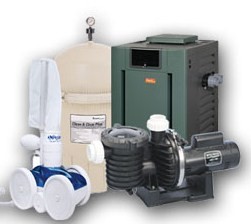Which Type of Pool Heating Is Best For You?
There are three major types of swimming pool heaters: solar, electric heat pump and gas. While we believe the vast majority of pool owners are best served by a solar pool heater, your unique circumstances and needs may dictate a different choice. This page briefly describes the three major types of pool heating and the strengths and weaknesses of each.
Solar
Solar pool heating is by far the most cost-effective way to heat your pool. The sun’s energy is clean, free and inexhaustible. And plentiful in Florida on a year-round basis. While solar does not have the ability to deliver any temperature on demand in any weather, you will never have to turn your solar pool heater off because you can no longer afford its operating cost.

A solar pool heating system can double your comfortable swim season in a warm pool
And depending upon what temperature you find comfortable, a solar pool heater may even triple your season. Also, keep in mind that during your current, unheated swim season, your pool can be much warmer if you prefer.
Solar pool heating is a very mature technology; thousands of solar pool heaters have delivered trouble-free operation in Florida since the late 1970s. Unlike a propane or natural gas pool heater with metal parts, a quality solar pool heater will keep you swimming in a warm, comfortable pool for the next 20 to 30 years.
All solar heating systems work on the same principle as a garden hose sitting out in the sun. The sun strikes the hose and the water inside is heated. Because the water temperatures required for swimming pool heating are relatively low, inexpensive but durable polypropelene plastic solar panels can be used for pool heating. However, because a swimming pool holds several thousand gallons of water, small temperature changes require large amounts of energy. So solar pool heating usually requires a large solar collector area: typically 80-100 percent of the swimming pool surface area.
Solar pool heating is best for those pool owners seeking the most environmentally friendly heating solution. If you are interested in going “clean and green,” solar is the way to go.
We are master dealers for Ecosun®solar pool heaters. Learn why we believe the Ecosun® solar pool heater by Aquatherm Industries is the world’s finest solar pool heating collector panel.
Electric Heat Pump
Swimming pool heat pumps work just like central air conditioning heat pumps, only in reverse. Instead of removing heat from the inside of your home and expelling it to the outside air, a pool heat pump takes heat out of the outside air and transfers it into your pool water. Swimming pool heat pumps can extract useful heat energy in air temperatures as low as 45–50°F, so they are very effective in Florida’s mild climate.

A swimming pool heat pump has three major advantages
- It’s substantially cheaper to operate than a gas heater (see below). The electricity required to run a swimming pool heat pump typically costs only one third as much as propane to deliver the same heat, and only half the cost of natural gas.
- Heat pumps deliver heat at night and during cloudy and rainy weather, so they offer more consistent and reliable performance than a solar pool heater, although this performance comes at a cost.
- Faster recovery time than a solar pool heater. A typically sized pool heat pump will put heat into a pool at a faster rate than a typically sized solar pool heater, so a pool heat pump may be a better choice when the ability to swim during periodic stretches of mild winter weather is a priority.
However, heat pumps do use electricity and electric rates will continue to rise. So if you have a suitable unshaded area to install a solar pool heating system, we strongly recommend that you consider the first of our three pool heating options.
Gas Heaters
Gas pool heaters, which burn either propane or natural gas, can maintain your pool at pretty much any temperature you desire. Want 90°F pool water over the holidays? No problem.
Well, actually there is a problem. The cost of both propane and natural gas has roughly tripled during the last 10 years.
With propane now costing $3.00 per gallon or more, it can easily cost as much as $4,000 to keep a 14 x 28 Central Florida pool at 80°F on a year-round basis.
That said, the great advantage of gas is the ability to maintain any temperature in pretty much any weather. As long as you are willing and able to pay. This might be important if you must use your pool for therapeutic exercise. Even so, with today’s high and rising fuel costs, we recommend that a gas heater be installed only as a backup system to supplement a primary solar pool heater or pool heat pump when 85–90°F pool water temperatures are medically required.

How much of the year can we expect to swim if we don’t heat our pool?
A lot depends upon how you use your pool and your tolerance for colder temperatures. Residents of northern climates are completely comfortable swimming in 78°F water and this is usually the temperature required for competitive swimming events. On the other hand, Florida residents usually like their pool water a bit warmer; at least 80°F or more. And if you are heating your pool for therapeutic reasons, you will want at least 85°F water and possibly as warm as 90°F.
A Southeast Florida screened pool will typically be at least 80°F or warmer for about three months and may reach 83–85°F from mid August to early September. Open pools are a bit warmer because the pool surface receives more direct solar energy, and may stay comfortable for an extra month or more.
What are the health benefits of heating my pool?
Doctors and physical therapists regard swimming as a very beneficial form of exercise because it works the entire body without impact stresses on the joints. A heated pool can safeguard your health and contribute to your well-being by allowing you to exercise throughout the year.
And while children love to swim and can often tolerate lower temperatures, pediatricians caution that repeated chilling can make young children more susceptible to respiratory infections. This can also be true for elderly swimmers. A heated pool prevents chilling and problems associated with excessive body heat loss.
Compared with a gas heater, how long does it usually take for a solar pool heater to pay for itself with savings?
After subtracting the installed cost of a gas heater and propane storage tank, you will usually recoup the additional cost of a solar pool heater within about one year for propane and less than two years in the case of natural gas.
This assumes keeping a pool at least 80°F or so during the spring and fall and at least 76°F or so during the winter, at current fuel costs. An additional financial benefit of solar is that the leading solar pool heating collector panels have useful lives of 20 years or more. Even the highest quality gas heaters have to be replaced every 10 years or so, and the average is probably closer to seven years.
